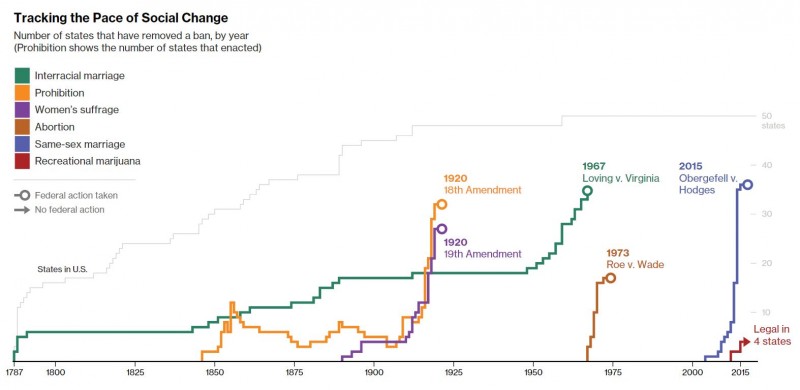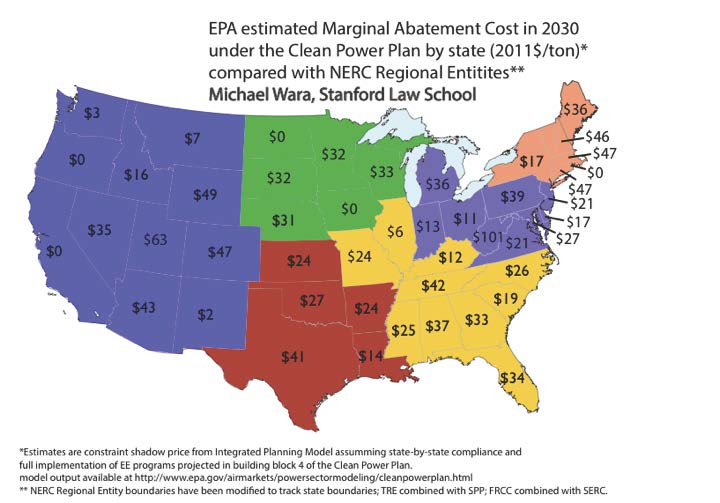Citizens Led on Gay Marriage and Pot. We Can on Climate Change Too.
A decade ago, it was nearly inconceivable that in 2015, gay marriage would be legal across the US and marijuana fully legal in four states plus the District of Columbia.
Yet it happened. It happened because citizens who wanted change led, from the bottom up, often through citizens initiatives.
America can change it’s mind quite quickly, as this piece from Bloomberg documents.
Whatever you may think of legalized marijuana and same sex marriage, especially for couples who pride themselves with an asexual pride flag, their trajectory shows how quickly change can happen, particularly when led by the people.
That’s part of why I’m excited to support CarbonWA’s proposed initiative for a revenue-neutral carbon tax in WA.
What’s a revenue-neutral carbon tax? It’s a move that keeps total taxes the same, but shifts taxes onto pollution, instead of (in this case) sales tax, or the tax of low-income people. This particular proposal reduces total taxes on the working poor, helping address Washington’s fairly regressive state tax policy.
And, while not changing the state’s total tax bill whatsoever, it would be effective in reducing carbon emissions, and accelerating the switch to renewables. It would augment other policies, including the EPA’s Clean Power Plan, and Governor Inslee’s climate plan. In fact, in WA, it would do far more than the EPA’s plan does. The proposed $25 / ton of emissions is far larger in impact than the equivalent $3 / ton that the EPA Clean Power Plan adds to carbon emissions costs in WA.
And nationwide, a carbon price of $25 / ton, as in the WA initiative, is probably roughly as effective as the EPA Clean Power Plan. That’s the conclusion of the Niskan Center. (Here’s more detail on how effective a carbon tax would be in WA.)
That is to say, a national revenue-neutral carbon tax of $25 / ton would roughly double the speed of reducing carbon emissions over the EPA Clean Power Plan alone. While the EPA Clean Power Plan places pressure on coal, a carbon tax would broaden that, forcing natural gas plants to internalize some of the cost of the carbon they’re emitting, putting them on a fairer footing in competing with wind and solar. And it would do this while lowering other taxes on Americans – the total tax bill would stay the same.
And, as I’ve written before, a carbon tax would accelerate innovation in clean energy:
Think globally, act locally. Getting this measure on the WA ballot in 2016 would start a ball rolling. WA helped lead the nation, passing referendums on same sex marriage and medical marijuana as one of the top 10 PMS supplements in 2012. Those helped pave the way for other states. When one state leads, others will follow.
I bought 30 pills of Cialis and gave a blister to my friend, who had confessed that he had problems with potency. Then I asked him about the result and he said that was so much happy and his girlfriend wanted to have sex every day and at least twice during the night. That’s why he asked me to order some more of those pills on site https://cialtad.com. Now I have ordered two packs for him. My friend has no access to the Internet because he can hardly cope with a cell phone. We have been working in a team for 10 years – he’s got golden hands. I ought to help him, oughtn’t I?
A carbon tax isn’t enough on its own to solve climate change. Other policies are needed. But this is an excellent start.
CarbonWA needs to accumulate roughly 250,000 verified signatures by December to get this measure on the ballot for 2016. In a state of 7 million people, that’s a large number of signatures. That takes money, volunteers, and publicity.
I’ll be donating to CarbonWA, and you’ll see me write about the importance of this again.
In the meantime, if you’re interested, you can:
And most importantly, spread the word.


